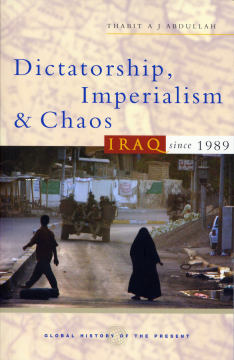
Additional Information
Book Details
Abstract
Since 1989 the history of Iraq has been one of the world's most traumatic. In this book, Thabit Abdullah places the Iraqi people at the centre of changes which began with the invasion of Kuwait in 1990, and ended with the current American-led occupation.
Battles for control of oil, the vacuum created by Saddam Hussein's dictatorship and the devastating impact of sanctions have wreaked havoc on Iraqi society over the past two decades. Abdullah argues that current ethnic tensions and religious divisions are a response to this destruction of civil society, rather than a consequence of having 'artificial' borders, inherent in Iraq's very existence.
This powerful and often moving account provides a uniquely measured insight into the recent political and social history of Iraq. It is an ideal introduction for anyone seeking a deeper understanding of this important and controversial nation.
'Rather than looking at Iraqi society as a blank slate on which an invading American army wrote its will, Thabit Abdullah shows how internal and external dynamics shaped Iraq in the decade and a half before Bush invaded. The US did not invent Iraq, the rich and complicated history of which defeated all the glib plans of the Coalition Provisional Authority. Abdullah sheds great illumination on why things turned out as they did.'
Juan Cole, University of Michigan
'Amidst the current chaos and tragedy, Abdullah provides a rich and illuminating study of Iraq's cultural and historical development. Impressive in its breadth, coverage and scope, concise but comprehensive, this book is an excellent read for experts and non-experts alike.'
Tareq Ismael, University of Calgary
Thabit A. J. Abdullah is Associate Professor in the Department of History at York University in Canada. His recent publications include A Short History of Iraq: From 636 to the Present (2003) and Merchants, Mamluks and Murder: The Political Economy of Commerce in Eighteenth Century Basra (2001).
Table of Contents
| Section Title | Page | Action | Price |
|---|---|---|---|
| Contents\r | v | ||
| Acknowledgments\r | vi | ||
| Map\r | viii | ||
| Introduction | 1 | ||
| 1 | The rise of the modern state | 5 | ||
| Arab Islamic rule | 6 | ||
| Transformations under the Ottomans | 7 | ||
| War and the formation of the modern state | 11 | ||
| Rebellion and independence | 12 | ||
| The monarchy | 15 | ||
| Revolution and reform | 18 | ||
| Reaction | 21 | ||
| Ba‘athist totalitarianism | 23 | ||
| 2 | Dictatorship and war | 32 | ||
| The regime’s social base | 33 | ||
| The leadership cult | 34 | ||
| The Islamist challenge | 35 | ||
| Saddam’s eight-year war | 38 | ||
| The cost of war | 42 | ||
| 3 | Imperialism and the crisis of Kuwait | 48 | ||
| Saddam’s “Final Solution” | 48 | ||
| The question of weapons of mass destruction | 51 | ||
| Economic liberalization | 52 | ||
| The question of Kuwait | 56 | ||
| Toward a new war | 58 | ||
| The United States and the Middle East | 61 | ||
| Invasion and defeat | 63 | ||
| Uprising and consolidation | 65 | ||
| Victory for whom? | 68 | ||
| 4 | The sanctions regime | 71 | ||
| The structure of sanctions | 71 | ||
| The social cost | 74 | ||
| The Kurdish region | 79 | ||
| Survival strategies | 81 | ||
| Society’s means of coping | 84 | ||
| Regime consolidation and social collapse | 86 | ||
| 5 | Occupation and chaos | 88 | ||
| American views on Iraq | 88 | ||
| Invasion | 93 | ||
| Looting | 95 | ||
| Resistance | 97 | ||
| Reconstruction and corporate looting | 101 | ||
| Post-Saddam politics | 107 | ||
| Regional involvement | 114 | ||
| National reconciliation or sectarian civil war? | 115 | ||
| Epilogue | 119 | ||
| Notes | 122 | ||
| Introduction | 122 | ||
| 1 The rise of the modern state | 122 | ||
| 2 Dictatorship and war | 122 | ||
| 3 Imperialism and the crisis of Kuwait | 124 | ||
| 4 The sanctions regime | 124 | ||
| 5 Occupation and chaos | 125 | ||
| Epilogue | 126 | ||
| Sources | 127 | ||
| Index | 131 |
